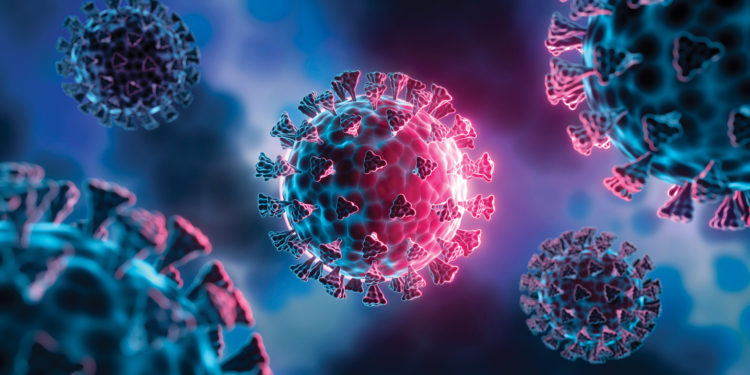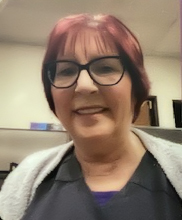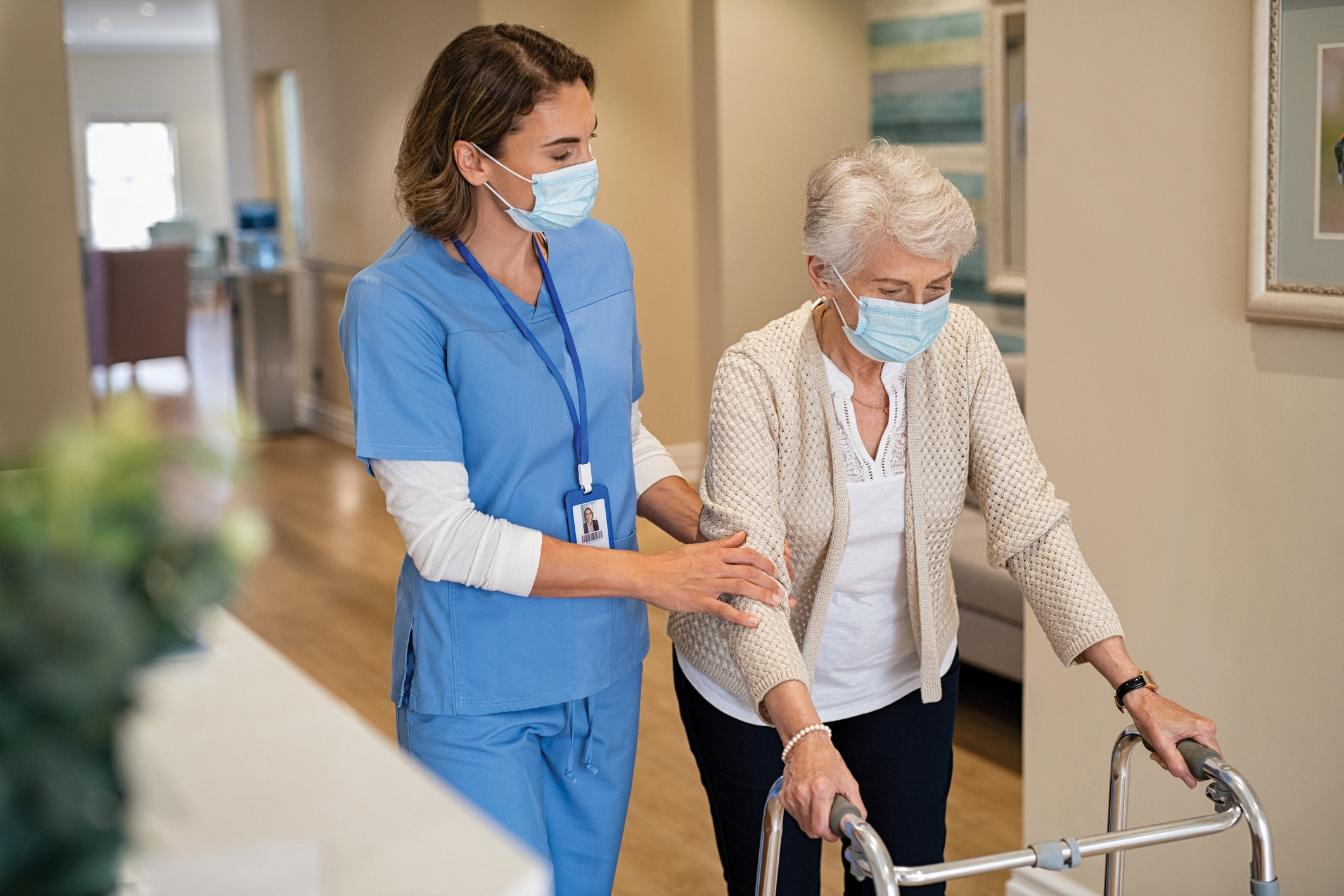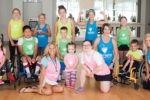Another Side of Covid

Written by Dave Eckert
There’s no doubt Covid-19 has changed our world. Even now, with vaccines and boosters, the virus continues to wreak havoc. Not long ago, I met a woman who has an interesting, and heartbreaking, first-hand view of Covid. Kristie Cozad Richerson is on the front lines of the disease, but not as an Emergency Room or Intensive Care doctor or nurse whom we have seen and heard from often during the pandemic. Richerson is a hospice nurse, working for Monarch Hospice and Palliative Care out of Shawnee, Kansas. I found her story to be both fascinating and tragic. She is, in my opinion, and I hope yours, a true hero, sacrificing her health for the care of others. What follows is, in part, what Richerson shared with me.
 “The week that the country was shutting down and we were being made aware of an impending pandemic, the hospice I was working for was under brand new management. We had very little understanding of Covid. We didn’t even know what to call it, and we didn’t have any idea of what the short or long-term symptoms were. We only knew that it could be fatal, that it was mostly a respiratory illness, and that when people were hospitalized and required ventilators, the outcomes were not good. So, it was terrifying for me, a 60-year- old nurse who already had lung issues to go out every day seeing patients in nursing homes and private homes without knowing if I was carrying something I could give them or if I was possibly picking up something that I could take home to my family. I personally have contracted Covid four times since the beginning of the pandemic – twice before a vaccine was available and twice after. The first time, April 2020, I had chronic pneumonia for weeks. I was very short of breath for months, and the combination of working all day, then arriving home to my split-level home every evening, getting up the 20 steps from my car to my bed was so exhausting, I would fall asleep at 6:00 every night. It was a struggle to get out the door in the morning at 8:00 and start seeing patients,” Richerson explained.
“The week that the country was shutting down and we were being made aware of an impending pandemic, the hospice I was working for was under brand new management. We had very little understanding of Covid. We didn’t even know what to call it, and we didn’t have any idea of what the short or long-term symptoms were. We only knew that it could be fatal, that it was mostly a respiratory illness, and that when people were hospitalized and required ventilators, the outcomes were not good. So, it was terrifying for me, a 60-year- old nurse who already had lung issues to go out every day seeing patients in nursing homes and private homes without knowing if I was carrying something I could give them or if I was possibly picking up something that I could take home to my family. I personally have contracted Covid four times since the beginning of the pandemic – twice before a vaccine was available and twice after. The first time, April 2020, I had chronic pneumonia for weeks. I was very short of breath for months, and the combination of working all day, then arriving home to my split-level home every evening, getting up the 20 steps from my car to my bed was so exhausting, I would fall asleep at 6:00 every night. It was a struggle to get out the door in the morning at 8:00 and start seeing patients,” Richerson explained.
Yet that’s exactly what she did from April 2020 until November 2020 when she says she finally started to feel a little better. Then, just two months later, in January 2021, Covid struck again. “They hadn’t reached our hospice with the vaccine, and they hadn’t reached the nursing homes I was going into, so I had been exposed to Covid every day I worked. This time, it was four months before I could go back to work because of the damage to my lungs and kidneys. I developed high blood pressure, and even worse, I developed vertigo that kept me bedbound, only able to crawl between bed and bathroom for weeks. I was able to get unemployment, but that loss of income caused me financial problems I’m still recovering from,” Richerson shared. “I was proud of us, though, as a profession. We were brave. We put our patients’ wellbeing first and foremost. We fought an enemy we didn’t understand with ingenuity and courage. I saw more deaths during March -December 2020 than I had in the three previous years I worked in hospice. I held a lot of hands, people dying from Covid and dying from the other illnesses that flourished because the healthcare system couldn’t manage the load. We did a lot of good in the community. We were so needed and appreciated by our families and patients.”
But there are also many frustrations, both personal and professional. “There was a mythical “front line” that took attention and care away from nurses in the field who were going into private homes and nursing facilities. We were every bit as much the “front line” as the ICU and ER staffs were. Saying that doesn’t take anything away from what they did. But there were weeks I didn’t have a proper mask, just a cloth one I made myself. I didn’t have gloves. We wore windbreakers into patient rooms instead of disposable gowns and sprayed them with Lysol when we came out. I know hospitals went without, as well. It was a tough time for everyone. But that distorted “front line” idea did a lot to divide us when we should have all been treated the same. Every nurse was on the “front line!” Richerson exclaimed. “But, more than that, the most frustrating thing I experienced was when I tested positive for Covid at work, when I was working with Covid positive patients every day and obviously exposed every day. I was told I could have five days off, then I was expected back to work. And my employer at the time said that I could have contracted Covid anywhere-there was no way to prove I got it at work. My second infection, when I couldn’t return to work for four months, my employment was terminated. I expected my employer, a healthcare provider, to be concerned about my health. But they were more concerned about their bottom line. I felt abandoned and frightened. I had no idea how long I would be out, and then I’d have to find another job when I could start working again. It added a lot of stress to an already stressful (understatement) situation. It was the most difficult of time in my life, with both my physical and financial health.”

Despite the frustrations, and two more bouts of Covid, Richerson remains amazingly positive-dedicated to providing the best healthcare she can to people who need it the most. “This is the best job in the world. I love what I do. Even on my worst days, when I am tired, behind on my charting, under lots of pressure to do so much for so many, and then another family gets added to my case load. When I get there, and see the family in crisis, and in need for our services, nothing else matters. I know I am where I am supposed to be, doing what I am supposed to do. I get re-energized, and the job gets done. If I don’t do this, and I have lots of reasons not to do this, including health challenges left over from my Covid infections, who will? Our workforce lost a lot of people over the past three years. People who just couldn’t do it anymore. People who didn’t want to get vaccinated and left the profession. People who felt the strain of doing more with less and just couldn’t handle it. Again, I love what I do. I can’t imagine doing anything else. Every day I go home knowing I have made someone’s life a little better. You can’t find that just anywhere,” Richerson told me.
Well said, Kristie Cozad Richerson. Well said.






